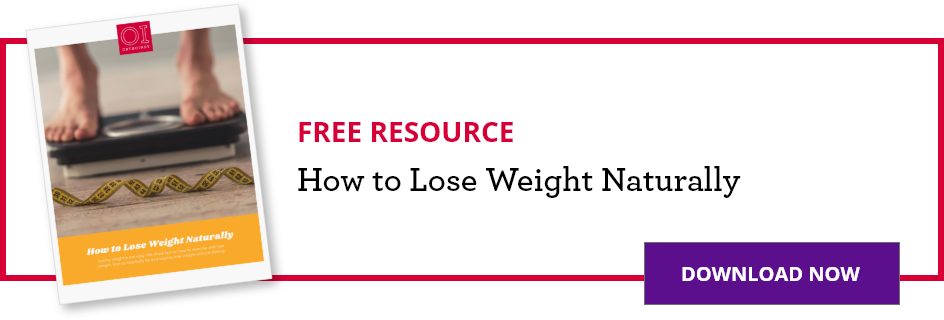THIS POST IS PART OF THE ULTIMATE GUIDE TO A HEALTHY LIFESTYLE
It’s no secret that eating healthy is important for your current and future wellbeing. However, it’s also no secret that a healthy diet is hard to keep consistent and learning how to eat healthy can be difficult and time-consuming.
Luckily, Jessica Regan, former OrthoIndy clinical nutrition manager and dietitian, is an expert on how to eat healthy food every day and was willing to share her eating healthy tips.
“There are so many benefits of healthy eating including having more energy, improving overall health and increasing productivity,” said Jessica. “However, it can be overwhelming to start eating healthy and break your normal routine.”
How can I start eating healthier?
- Be realistic: Changing your eating habits is difficult, so take baby steps. Make realistic and attainable goals. If you eat out once a day, try only eating out every other day for a couple weeks. Doing too much, too soon might make you irritable and more likely to fail on your diet change.
- Know that you can still enjoy food: Eating healthy doesn’t mean cutting everything you enjoy out of your diet. It’s about learning balance and still allowing yourself to enjoy the food you eat.
- Follow a healthy eating plan: Those who have a plan find more success in changing their diet to a nutritious one. This doesn’t mean jumping on board the most recent diet fad. It means finding a healthy meal plan that works for you and your needs.
- Reward yourself: After achieving mini goals, reward yourself with something you have been wanting such as a pedicure, favorite small treat or a moment to yourself to be proud of your achievements before you move on to the next goal. On the other hand, if you fail don’t punish yourself. Setbacks will happen but brush it off and get back on track. Don’t let your setback define your future.
How do I make a healthy meal plan?
A healthy meal plan should include healthy foods like fruits, vegetables, whole grains, low-fat dairy, lean meats, seafood, beans and nuts. You can still include some of the foods you love, but you will want to focus on slowly removing food that is heavily processed and high in fat or calories.
Keeping a food diary so you are aware of what you are consuming and the amount of fat or calories in each meal can help keep you on track. MyFitnessPal is the leading resource in nutrition tracking and is free to use.
“Every person is unique and requires different amounts of calorie intake based on their age, gender, height, weight, activity level, diagnoses and more,” said Jessica. “However, there are a few guidelines that can give you an idea of what to aim for if you are a normal, healthy individual.”
Guidelines for healthy eating
- The typical standard for estimating daily calorie needs is 25-30 kcal/kg of body weight
- Take your weight (lbs.) and divide by 2.2 to get kilograms
- Multiply that number by 25-30 to get your estimated calorie needs
- If you are active, you may need to increase your calories to 30-35 kcal/kg
- Protein should be 10 to 30 percent of your daily calories
- Carbohydrates should be 45 to 65 percent of your daily calories
- Fat should be 25 to 35 percent of your daily calories
- Fluid needs can be estimated at 30 mL/kg of body weight
- Try to consume less than 10 percent of calories from added sugar and saturated fats
- Limit sodium intake to less than 2,300 mg per day
How to eat healthy on a budget
Yes, healthy food can be expensive; however, there are many ways to save money and still follow a healthy eating plan.
- Plan your meals: Planning your meals ahead of time, making a grocery list and sticking to the plan means less waste
- Cook at home and pack your lunch: Cooking at home is pretty much always cheaper than going out; make all your meals in one day for the week by meal prepping or make one meal at a time and eat all the leftovers before making a new meal, either way, you’ll be saving money
- Replace meat with other proteins: Meat is usually the most expensive part of any grocery shopping trip, replacing meats with other proteins such as eggs, seeds or canned fish is a good way to save a few dollars
- Eat produce that is in season: Buy local produce that is in season and freeze what you don’t use; when they aren’t in season, buy frozen fruits and vegetables
“Although some healthy foods can be expensive at the grocery, it is worth investing in because it will improve your overall health and likely save you money in the long run,” said Jessica.
Other helpful posts
- Nutrition for before and after your workout
- How to eat healthy at a restaurant
- The importance of protein
Learn more healthy tips for living an active and nutritious lifestyle.
Schedule an appointment
Your well-being is important to us. Click the button below or call us to schedule an appointment with one of our orthopedic specialists. If your injury or condition is recent, you can walk right into one of our OrthoIndy Urgent Care locations for immediate care. For rehabilitation and physical therapy, no referral is needed to see one of our physical therapists.






